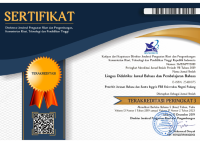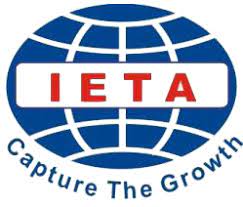Students’ Strategies with Technology Integrated to Overcome the Interlanguage Issue
 ), Anhar Anhar(2), Sabarniati Sabarniati(3),
), Anhar Anhar(2), Sabarniati Sabarniati(3), (1) Politeknik Aceh
(2) Politeknik Aceh
(3) Politeknik Aceh Selatan
 Corresponding Author
Corresponding Author
Copyright (c) 2024 Lingua Didaktika: Jurnal Bahasa dan Pembelajaran Bahasa
DOI : https://doi.org/10.24036/ld.v18i1.123660
Full Text:
 Language : en
Language : en
Abstract
During the achievement of the target language, interlanguage becomes a serious issue in second language acquisition (SLA). The influence of the student’s mother tongue both on vocabulary and structure plays an essential role, particularly in oral performance. This qualitative study aims to find out the interlanguage fossilization as well as the digital media used to overcome the interlanguage. In this study, 23 non-English department students participated by videotaping their speaking performance spontaneously for about two minutes. Each student submitted a video on the subject of “My Childhood” via google classroom at the end of the English program. Not only the documentation but also the interview is employed; five of the students took part in it. Additionally, the students’ strategies to be proficient in English were expressed. The findings indicated the syntactical errors in pronouns errors, articles, concords, and fragments and the morpheme errors in suffixes. Meanwhile, learning English videos integrated with technology such as YouTube, TikTok, and Instagram promotes the students’ strategies to boost their speaking skills.
Keywords
References
Ariantini, K. P., Suwastini, N. K. A., Adnyani, N. L. P. S., Dantes, G. R., & Jayantini, I. G. A. S. R. (2021). Integrating Social Media into English Language Learning: How and to What Benefits According to Recent Studies. NOBEL: Journal of Literature and Language Teaching, 12(1), 91–111. https://doi.org/10.15642/nobel.2021.12.1.91-111
Chen, H., & Zhao, B. (2013). A Study of Interlanguage Fossilization in Second Language Acquisition and Its Teaching Implications. Erse, 18–20. https://doi.org/10.2991/erse.2013.6
Cropley. (2022). Qualitative research methods:A practice-oriented introduction.
Ellis, R. (1997). Second Language Acquisition (Series Editor H. G. Widdowson). Oxford: Oxford University Press.
Fauziati, E. (2011). White dan Genesse. CONAPLIN JOURNAL Indonesian Journal of Applied Linguistics, I(1), 25–40.
Golonka, E. M., Bowles, A. R., Frank, V. M., Richardson, D. L., & Freynik, S. (2014). Technologies for foreign language learning: A review of technology types and their effectiveness. Computer Assisted Language Learning, 27(1), 70–105. https://doi.org/10.1080/09588221.2012.700315
Guo, Q. (2022). Interlanguage and Its Implications to Second Language Teaching and Learning. Pacific International Journal, 5(4), 08–14. https://doi.org/10.55014/pij.v5i4.223
Kuning, D. S. (2020). Application of Social Media to Learn Speaking. Jurnal Elsa, 18(1), 77–85.
Manihuruk, L. M. E. (2022). Error Analysis in Using Inflectional Morphemes Students’ Recount Text of English Students. IJECA (International Journal of Education and Curriculum Application), 5(1), 53. https://doi.org/10.31764/ijeca.v5i1.7783
Manogaran, D., & Sulaiman, N. A. (2022). Systematic Review: Effectiveness of Social Media in Improving Speaking Skills of ESL Learners. International Journal of Academic Research in Progressive Education and Development, 11(3), 737–752. https://doi.org/10.6007/ijarped/v11-i3/14722
Nagy, T. (2021). Using Technology for Foreign Language Learning: The Teacher’s Role. Central European Journal of Educational Research, 3(2), 23–28. https://doi.org/10.37441/cejer/2021/3/2/9347
Ni Luh Putu Sri Adnyani, & Kusumawardani, D. A. N. (2020). Interlanguage Analysis on Speech Produced by EFL Learners. RETORIKA: Jurnal Ilmu Bahasa, 6(2), 178–185. https://doi.org/10.22225/jr.6.2.1727.178-185
Pradana, F. R., Baru, H., Samarinda, K., Timur, K., Fauzan, U., Baru, H., Samarinda, K., & Timur, K. (2021). Borneo Journal of Language and Education. I(1), 53–67.
Saville, T.M. (2006). Introducing Second Language Acquisition. Cambridge : C. U. P.
Selinker, L. (1972). "Interlanguage". In J Schumann and N. Stenon, eds. New Forties in Second-Language Learning. Rowley, Mass.: Newbury
Sharma, T. P. H. & V. (2019). Influence of Mother Tongue on Teaching English as a Second Language. IJARIIE, 5, 326–336.
Syafiq, A. N., Rahmawati, A., Anwari, A., & Oktaviana, T. (2021). Increasing Speaking Skill through YouTube Video as English Learning Material during Online Learning in Pandemic Covid-19. Elsya : Journal of English Language Studies, 3(1), 50–55. https://doi.org/10.31849/elsya.v3i1.6206
Wei, X. (2008). Implication of IL Fossilization in Second Language Acquisition. English Language Teaching, 1(1), 127–131. https://doi.org/10.5539/elt.v1n1p127
 Article Metrics
Article Metrics
 Abstract Views : 169 times
Abstract Views : 169 times
 PDF Downloaded : 65 times
PDF Downloaded : 65 times
Refbacks
- There are currently no refbacks.
Copyright (c) 2024 Lingua Didaktika: Jurnal Bahasa dan Pembelajaran Bahasa

This work is licensed under a Creative Commons Attribution-NonCommercial 4.0 International License.










